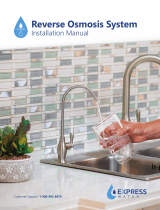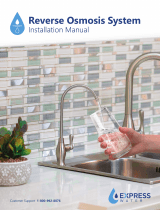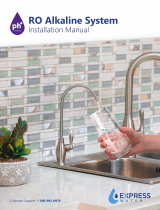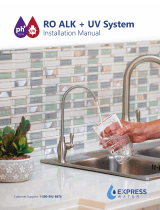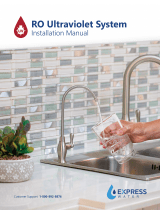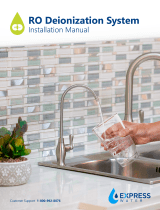
7 8
Starting-up the Purifier
Important Safety Instructions
•
If the supply cord is damaged, it must be replaced by the original part in
order to avoid hazard.
•
Only use this system on potable water supplies. Do not use this system
where the water is microbiologically unsafe or of unknown quality without
adequate disinfection before or after system.
•
Excessive incoming water pressure can cause leaks, flooding and property
damage. It is highly recommended to monitor your home’s incoming water
pressure over a period of 24 hours to determine if a pressure regulator is
required.
•
Manufacturer assumes no responsibility for damages incurred through
improper installation or use of these products. Incorrect installation or
operation will void the warranty.
•
Do not use copper fittings or tubing on RO product water. Due to the high
purity, it can leach the minerals from copper tubing and develop pinhole
leaks over time.
•
Please TURN OFF the main cold water supply to the RO system when the
unit is not in use during a vacation or extended leave. During very cold or
freezing weather conditions, please also TURN OFF the main cold water
supply and completely drain all of the water from the RO system and water
storage tank.
•
Never use hot water or allow the unit to freeze.
• Before plugging in the power supply, open the feed
inlet ball valve (the handle will be parallel to the feed
line) to start the flow of water into the purifier. Open
the faucet and wait for 1-2 minutes while the unit fills
with water and the air is purged.
•Plug in and switch on the power supply.
•Let water flow for first 5 mins to flush the filters.
• Close
the faucet.
•The purifier is ready to use.
• Select a location for the drain hole based on the design of the plumbing. It
should be installed above the trap and on the vertical or horizontal tail piece.
To avoid possible drainage noise, mount drain line as low as possible on the
vertical tailpiece. Do not install downstream of a garbage disposal, as this
can cause contamination and system fouling.
Drain Line Installation Instructions
• Place the self-adhesive black foam square over the hole, making sure
the holes match.
• Place one half of the plastic drain saddle assembly on each side of the
drain pipe with the fitting, and clamp loosely using the nuts and bolts
included.
• Align the hole drilled in the drain pipe with the hole in the drain saddle.
Make sure to align the drain saddle hole to the drilled hole perfectly. A
drill bit or other long narrow object may be used to help align correctly.
• Use Phillips screwdriver to tighten the clamp. Avoid over-tightening.
• Install one end the blue tubing to the drain saddle fitting, and the other
to the system connection marked
‘Reject Water’ (#2 on the page 6 diagram).
OR HERE
• Install the faucet , faucet base and large
black washer on top of the counter, and
inserting the threaded pipe through the
pre-drilled 1/2” hole.
•From beneath, thread on the washers and
lock nut to secure the faucet to the counter.
Check the positioning then tighten the lock
nut with a wrench.
Faucet Installation Instructions
Faucet Base
Large Black Washer
Countertop
Lock Washer
Small Black Washer
Lock Nut
Tube Insert
Tube Sleeve
Compression Nut
1/4" White Tube
Faucet Installation Instructions (Continued)
• Slide the compression nut then sleeve onto one end of the ¼“ white tube.
Insert the tubing insert into the end of the tubing. Slide the tubing (until it
stops) into the faucet stem and screw it in by hand with the nut
• Connect the other end of the tubing to the system care fitting labeled
‘Faucet’ (#1 on the page 6 diagram).








